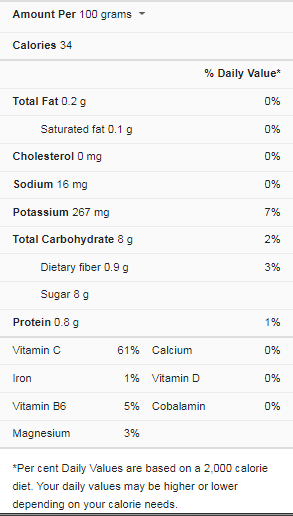Cantaloupe contains a small number of carbohydrates. Ninety percent of cantaloupes are made up of water, and it’s almost as though you’re eating a watermelon. Because of their high liquid content, cantaloupes have a low glycemic load. Your body will digest food slowly, and your blood sugar will not rise. As a result, people with diabetes will find it to be an ideal choice. It maintains your hydration.
Cantaloupes are high in electrolytes. These minerals keep your body working correctly by balancing body fluids. You’ll stay hydrated and invigorated as a result of this. It has the potential to help with disease therapy. Phytonutrients found in cantaloupes have anti-inflammatory properties, and it’s an essential component of a well-balanced diet.
Cantaloupe Nutrition Facts
Cantaloupe’s Health Benefits
If you haven’t had cantaloupe yet this summer, you should do so immediately. The warm-weather fruit is packed with critical nutrients from disease-fighting antioxidants to constipation-busting fiber. Cantaloupe is surprisingly adaptable; it’s delicious frozen in ice pops, raw off the rind, and even grilled as a supper dish. Learn about cantaloupe’s health advantages and how to choose and cut the melon for the most fruitful summer yet.
Fights Oxidative Stress
“Vitamin C is one of the most well-known antioxidants present in cantaloupe,” explains Kelsey Lloyd, M.S., R.D., a registered dietitian. According to registered dietitian Laura Iu, R.D., C.D.N., it combats oxidative stress by neutralizing free radicals before they “build up in the body [and] cause damage to cells.” And this is significant because high levels of oxidative stress are linked to the development of chronic diseases like cancer and heart disease. According to an article in Nutrients, vitamin C helps the body regenerate vitamin E, another antioxidant. (Y’all, the more, the merrier.)
While vitamin C is potent, it isn’t the sole antioxidant in cantaloupe. According to Lloyd, beta-carotene, an antioxidant and pigment found in orange fruits and vegetables (like carrots), is present in the melon. When combined with vitamin C, Beta-carotene makes cantaloupe an A+ source of disease-fighting antioxidants. (By the way, beta-carotene is also responsible for the summery color of melon.) According to The University of Maine, the darker the meat, the more beta-carotene in each bite.)
Supports the Immune System
The summertime melon can help safeguard your immune system because of its vitamin C and beta-carotene content. Vitamin C, according to Lloyd, “supports [the regeneration] of new tissues in your body,” which aids in wound healing. According to a 2019 article, it’s also “critical for neutrophil function.” Neutrophils are a type of immune cell that “eats” harmful germs, lowering the chance of infection or damage caused by the germs. Vitamin C also protects lymphocytes (another immune cell) against oxidative stress, according to a review published in Frontiers of Immunology in 2020.
Lymphocytes handle toxins, viruses, bacteria, and malignant cells. When it comes to beta-carotene, it’s a no-brainer. According to Kylie Ivanir, M.S., R.D., registered dietitian and founder of Within Nutrition, “beta-carotene is transformed into vitamin A” in the body. Vitamin A is also thought to aid in developing, and growing immune cells, such as the lymphocytes discussed earlier. (See also: 7 Natural Ways to Boost Your Immune System)
Promotes Healthy Digestion
“Cantaloupe fiber is both soluble and insoluble,” Lloyd explains. “Both fibers are beneficial to maintaining the health of your digestive tract.” To begin with, soluble fiber is, as you may have imagined, soluble. According to Oregon State University, when it comes into touch with H20 (and other liquids) in the gut, it creates a gel-like substance that aids in the formation of stool, reducing constipation (by softening dry stool) and diarrhea (by firming up loose stool).
Insoluble fiber, on the other hand, does not mix with water. According to the University of California San Francisco, this helps move food through your digestive tract, keeping you regular and preventing (and alleviating) constipation.
When it comes to this health benefit of cantaloupe, keep in mind that you should avoid consuming too much at once if you don’t eat many fiber-rich foods (such as fruit). According to Lloyd, gradually adding fiber to your diet — from any source — is critical. She notes that going from 0 to 100 might induce abdominal cramps, gas, bloating, and general discomfort. Start with a one-cup serving of cubed cantaloupe, as recommended by the USDA, and see how you feel.
Promotes the Health of the Heart
According to the Centers for Disease Control and Prevention, high blood cholesterol and blood pressure are key risk factors for heart disease. On the other hand, Cantaloupe can help minimize these risks because of its soluble fiber, potassium, and vitamin C content. According to a 2019 study, soluble fiber lowers blood cholesterol by boosting the elimination of excess cholesterol in the stool. According to the American Heart Association, potassium lowers blood pressure by increasing the amount of sodium excreted in the urine.
According to a 2019 article in the journal Nutrients, high sodium levels cause your body to hold on to water, creating high blood pressure.) What about vitamin C? According to a 2017 study, vitamin C can boost nitric oxide synthesis, and this chemical relaxes blood arteries and enhances blood flow (hence lowering blood pressure). (For further information, see Why You Should Eat More Guava Fruit This Summer.)
Boosts Hydration
Cantaloupe, which is around 90% water, is a pleasant method to improve your water intake, according to the Academy of Nutrition and Dietetics. “We require water for everything our bodies do,” Lloyd explains. She notes that it’s required for digestion, metabolism, blood pressure regulation, and natural detoxification processes in the liver and kidneys (think: eliminating waste and toxins from the blood).
“Water is also necessary for carrying nutrients throughout the body and controlling body temperature,” Iu says. On the other hand, according to Iu, drinking too little water can lead to dehydration, inducing unpleasant symptoms including nausea, dizziness, exhaustion, muscular spasms, and constipation. According to the Mayo Clinic, you’ll be more likely to satisfy your daily hydration needs if you drink enough fluids and consume hydrating foods like melon (i.e., 11.5 cups for women).
Is it Possible to Lose Weight by Eating Cantaloupe?
Although cantaloupe does not burn fat, it can aid in weight loss by lowering your energy intake. For example, you can use it to minimize carbs and remain fuller longer by substituting it for bagels, chips, cookies, and other snacks. According to Majumdar, foods high in fiber, such as cantaloupe, are whole, and filling meals help us feel satiated, reduce appetite, and maintain a healthy weight.
Cantaloupe is naturally low in calories (approximately 60 calories per quarter melon) and fat and cholesterol-free. This mineral, which can help decrease blood pressure, is abundant in cantaloupes. However, too much of it can cause issues if you have kidney disease. Because your organs may not be able to filter out all of the extra potassium, you may develop hyperkalemia, a dangerous illness.
Is it Better to Eat Watermelon or Cantaloupe?
Advertisement. Cantaloupe has higher vitamin C than watermelon, which helps the immune system. It contains antioxidants lutein and zeaxanthin, which help prevent macular degeneration, a condition in which the retina deteriorates. Cantaloupe and honeydew melon are healthy options, but cantaloupe has more antioxidants.
The honeydew melon rind and cantaloupe meat variety of melon is an intelligent choice for reducing your risk of foodborne illness. Watermelon is just as nutritious as cantaloupe, although it has slightly more calories and carbohydrates.
Is Cantaloupe a High-Sugar Fruit?
Most melons are also low in sugar. Even though they only have 8 grams of sugar per 100 grams, cantaloupe and honeydew melons are adorable and delectable. Watermelon is a delightful and refreshing snack, but it contains surprising sugar. The sugar content of this delectable melon is less than 13 grams.
Although this is higher than most fruits, keep in mind that a 12-ounce can of soda contains roughly 40 grams of sugar and has virtually little nutritious benefit. As a result, both diabetics and those at risk of developing diabetes should consume cantaloupes in their whole food form.
Is Cantaloupe Good for your Skin?
The antioxidant has been shown in studies to enhance sun-damaged skin and repair, moisturize, and stabilize collagen formation in the skin. Muskmelon, cantaloupe, is not only a delicious summer snack, but it’s also a terrific fruit for keeping your skin supple and radiant. The fruit is full of minerals, including vitamins A, B, and C, which help the skin stay healthy, young, and supple and keep moisturized.
Vitamin K and E are included in cantaloupe and aid in maintaining the skin healthily and beautifully. They’re also high in Vitamin B, choline, and betaine, all of which aid in repairing and revitalizing the skin. Cantaloupes promotes skin regeneration and collagen synthesis due to their high vitamin A and C content.
Conclusion
Cantaloupe is a sweet, orange summer fruit related to watermelon and honeydew melon. Cucumbers, pumpkins, squashes, and gourds are all the same plant family members. Cucumis melo reticulatus, a muskmelon species, is the most common semi-sweet cantaloupe in the United States.
The scientific name is “reticulated,” which describes the cantaloupe’s rough, webbed outer skin. Cantaloupes have been grown for thousands of years, and most experts agree that they originated in Persia (modern Iran). Christopher Columbus brought the fruit to the New World on his second expedition in the late 1400s.




